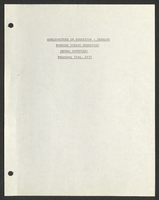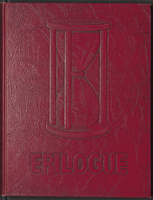Search the Special Collections and Archives Portal
Search Results

Law School Hearings and Subcommittee on Education Hearings: minutes
Date
Archival Collection
Description
Folder from the John Vergiels Political Papers (MS-00283).
Text

Epilogue: Nevada Southern University Yearbook, 1962
Date
Description
Yearbook main highlights: schools and departments; detailed lists with names and headshots of faculty, administration and students; variety of photos from activities, festivals, campus life, and buildings; campus organizations such as sororities, fraternities and councils; beauty contest winners; college sports and featured athletes; and printed advertisements of local businesses; Institution name: Nevada Southern University, Las Vegas, NV
Mixed Content

June Monroe and Kazuko Atomura oral history interview: transcripts
Date
Archival Collection
Description
Oral history interviews with June Monroe and Kazuko Atomura conducted by Cecilia Winchell and Stefani Evans on July 14 and July 19, 2022 for Reflections: the Las Vegas Asian American and Pacific Islander Oral History Project. In the first interview, Kazuko Atomura describes her childhood in Taiwan and Tokyo, Japan, and shares both happy and difficult mememories of that time. Atomura eventually moved to Los Angeles, California, where she reconnected with a man she previously met in Japan. She married him and together had their daughter, June Monroe, and another son while living in Corpus Christi, Texas. After difficult medical procedures involving Atomura's husband and Monroe's younger brother, Brian, the family relocated to Las Vegas, Nevada. Monroe recalls attending Las Vegas High School and Bonanza High School, and the struggle of making new friends as a young person. In the second interview, the mother and daughter discuss racism, discrimination, and identity. Kazuko Atomura recalls her many experiences with discrimination as a result of both her appearance and language barriers. June Monroe discusses how she came to be proud of her Japanese heritage, while Atomura discusses some of the community activities she has been involved in since living in Las Vegas including the Japanese Culture Club and odori dancing. Then, both Atomura and Monroe discuss Monroe's brother, Brian, who received two kidney transplants; one from Monroe's father and one from Monroe herself. Atomura talks about the shrines she has built for Brian, the experience of him being on dialysis, care taking, and his final days. Monroe shares about her activism with organ donation, being regularly involved with the Nevada Donor Network and helping to pass significant pieces of legislation within the area of organ donation.
Text

Transcript of interview with Peggy Huber by Greg Pushard, March 14, 1981
Date
Archival Collection
Description
On March 14th, 1981, collector Greg Pushard interviewed postmaster Peggy Huber (born March 31st, 1884 in Conway, Arkansas) in her home in Las Vegas, Nevada. This interview covers Peggy’s life in Nevada and also offers an insightful overview of Nevada’s rich history. During this interview Peggy discusses life on the ranch, mining, settlement, and the local early aboveground atomic blasts.
Text

Transcript of interview with Floyd Jenne by Ping Lee, March 10, 1981
Date
Archival Collection
Description
On March 10, 1981, Floyd Jenne (born June 6th, 1915 in Ogden, Utah) was interviewed by Ping Lee at the University of Nevada, Las Vegas. The interview covers Mr. Lee’s life as a police officer in Boulder City, Nevada. Mr. Lee also recalls going to school in McGill, Nevada and Ely, Nevada and working in Boulder City and Las Vegas, Nevada.
Text

Joseph Kine interview, March 02, 1976: transcript
Date
Archival Collection
Description
On March 2, 1976, collector Debbie Nesbit interviewed Joseph Kine (born November 16th, 1906 in Elkhart, Iowa) in his home in Boulder City, Nevada. In this interview, Mr. Kine discusses working at Hoover Dam (Boulder Dam) as a high scaler. He also speaks about living in Boulder City in its very beginnings as a town.
Text

Transcript of interview with Donald E. Klinker by Barbara Fidelman, February 13, 1975
Date
Archival Collection
Description
On February 13, 1975, Barbara Fidelman interviewed former Caesar’s Palace cage manager, Donald E. Klinkner (born November 28th, 1935 in Los Angeles, California) in his home about his life and perspectives on Southern Nevada. The two discuss the different recreational activities that Klinker participated in during the fifties and sixties. The interview concludes with Klinkner explaining the misconceptions that tourists have about Las Vegas, Nevada.
Text

Virginia T. Lanier interview, March 16, 1981: transcript
Date
Archival Collection
Description
From the Ralph Roske Oral History Project on Early Las Vegas collection OH-01060. On March 16, 1981, collector Heidi G. Hughes speaks to Virginia T. Lanier at the collector’s home in Las Vegas, Nevada. Lanier talks about living on the Strip in Las Vegas, Nevada in the 1950’s and 1960’s. She speaks about her experiences riding the bus, working in food service, and what the Strip was like during the time period.
Text

Transcript of interview with Gordon Christie by Larry DuRussel, June 30, 1975
Date
Archival Collection
Description
On June 30, 1975, Larry DuRussel interviewed carpenter Gordon Christie, (born March 9th, 1916 in Grand Rapids, Michigan) at his home in Las Vegas, Nevada. During this interview Gordon discusses having worked on the building of the MGM, Fremont Downtown, the Sahara Hotel, Desert Inn, and the Frontier Hotel, amongst others. Before becoming a carpenter, Gordon recalls working with his father at a furniture factory. He also discusses religion, politics, family life and the growth of Las Vegas.
Text

Transcript of interview with Frank Cope by Marianne Johnson, March 15, 1978
Date
Archival Collection
Description
Text
